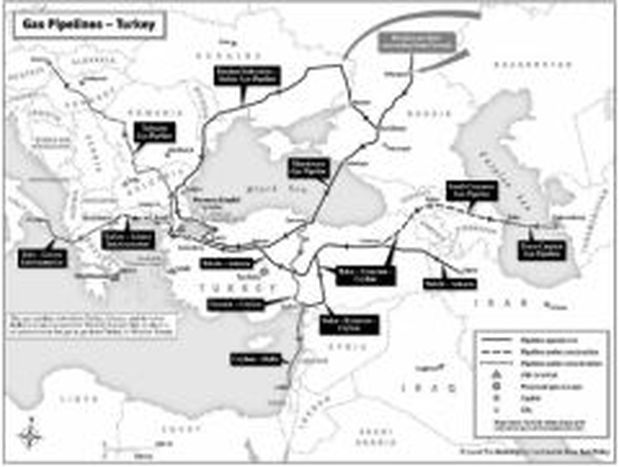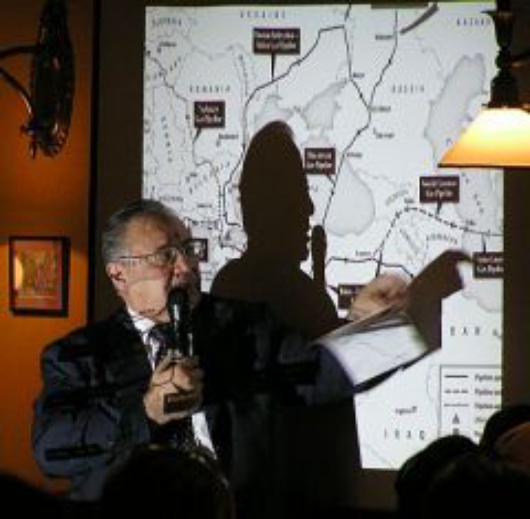
Nabucco versus Blue Stream
Published on
All those concerned with foreign politics and energy policy, and in particular with one of today’s Europe’s most pressing issues: energy-dependence, were invited to take part in the debate organised by the Budapest team of cafebabel.com in Café Centrál on June 8 2007.
The people gathered together with the aim to get some first hand information – free of political influence – about the European context of the energy business to be able to formulate their opinion on the subject.
How to celebrate the 50 years anniversary of the Union in a truly Babelian way?
This was the question that haunted the Budapest team for long when we got together on a chilly Thursday afternoon to hold our weekly meeting. That afternoon we decided to organise a round-table discussion on one of the hottest, but for sure the most pertinent question Europe has to face nowadays: energy security.
The topic is characterised by almost antagonistic national interests coupled with total uncertainty. The Commission is strong on promoting the common energy policy and the realisation of the “Nabucco” gas pipeline project, planned since 2002. Yet these efforts are overshadowed by the fact that some of the Member States have already concluded long-term bilateral agreements with Russia in order to secure their own energy needs. Following the Russo-Ukrainian gas-debate last January it still seemed that Europe was united, and the diversification of gas supplies could be the aim that links the Member States and foster the implementation of the common energy policy.
Is it the same old European story told once more? Will another promising European plan be caught in the net of conflicting national interests yet again? Is there a role for Hungary in the common concept?
 We are shortly before five, and the salon on the mezzanine is fully packed. Coffees are already served when, after the introductory words of Linda Mézes, head of the Budapest editorial office, István Szent-Iványi, member of the Foreign Affairs Committee of the European Parliament is given the speech. Mr. Szent-Iványi brings our attention to the fact that Energy should not be viewed from a financial point of view, but rather as an important strategic question. The countries that are dependent from others are left behind in the global race. He also reminded us that the common energy policy does not exist today and, therefore, the Nabucco-project is only feasible in as much as the Member States are ready to cooperate and to show a great deal of solidarity towards each other. The diversification of resources is inevitable for Hungary, since the country is 100% dependent on Russian gas. However, the realisation of the Nabucco pipeline would be in the interest of Romania and Bulgaria as well.
We are shortly before five, and the salon on the mezzanine is fully packed. Coffees are already served when, after the introductory words of Linda Mézes, head of the Budapest editorial office, István Szent-Iványi, member of the Foreign Affairs Committee of the European Parliament is given the speech. Mr. Szent-Iványi brings our attention to the fact that Energy should not be viewed from a financial point of view, but rather as an important strategic question. The countries that are dependent from others are left behind in the global race. He also reminded us that the common energy policy does not exist today and, therefore, the Nabucco-project is only feasible in as much as the Member States are ready to cooperate and to show a great deal of solidarity towards each other. The diversification of resources is inevitable for Hungary, since the country is 100% dependent on Russian gas. However, the realisation of the Nabucco pipeline would be in the interest of Romania and Bulgaria as well.
As András György Deák, the expert on Russia at the Hungarian Institute of International Affairs, put it: both the “Nabucco” and the “Blue Stream” projects are “standing on elusive ground”. Russian presence is already established on the Turkish as well as on the European markets but the Gazprom cannot exercise enough pressure on Turkey, thus it is not in its interest to build a pipeline there. The building of the Blue Stream pipeline would be an extremely expensive enterprise. What is more, Mr. Deák also recalled that in the gas industry the role of transit states (such as Ukraine) is just as important as that of the producer or consumer states. As for Hungary, the country “needs the pipeline through the Balkans like a piece of bread” to shorten its dependence on Russian supplies by becoming a transit country, thus making itself less vulnerable. In case of a pan-European accord on the pipeline András Deák did not exclude the possibility that Russian capital would play a part in the construction of Nabucco.
Tamás Magyarics, the USA expert of the Hungarian Institute of International Affairs, evaluated the two different options from a geopolitical and American point of view. He pointed out that the biggest oil and gas fields lie in politically instable regions. Moreover, the USA are confronted with Russia in the Central-Asian region and the American interests are contrary to the interests of the Chino-Russian tandem in Afghanistan, Iran and Pakistan. Tamás Magyarisics reasoned that Turkey is one of the key countries in the energy debate, being a transit region of paramount importance. The Caucasian countries are divided between the USA and Russia, Azerbaijan and Georgia being in favour of Washington whilst Armenia is a traditional ally of Moscow.
Szabolcs Ferencz I. the communication director of the biggest Hungarian oil company, MOL, agreed with the fellow speakers in that it is essential for Hungary to be the transit country for as many pipelines as possible, may it be the Nabucco or Blue Stream, to help minimize the transit-risks. According to him, the installation of a pipeline should foremost be a financial and not a political question. It is all the more so, since the estimated costs of the Nabucco project amount up to 5 billion €, a sum that nobody is ready to pay from taxpayers’ money. He drew attention to the fact that contrary to what is widely believed, both the Nabucco and the Blue Stream would carry resources both from Central-Asia and from Russia. The Nabucco would still rely primordially on Russian gas (70%) and only to a lesser extent on other, mainly Central-Asian, supplies (30%).
 Haszan Haszanov, Azerbaijan’s ambassador to Hungary, also took part in the debate. The diplomat told that the Nabucco-project was planned to involve three gas producer countries: Turkmenistan, Kazakhstan and Azerbaijan; three transit states, namely Azerbaijan, Georgia and Turkey; and Bulgaria, Romania, Hungary, Austria and other EU Member States as final consumers. Though the EU has not entered into negotiations with either of the states concerned, the ambassador, nevertheless, underlined his country’s willingness to make investments in order to help realizing the project.
Haszan Haszanov, Azerbaijan’s ambassador to Hungary, also took part in the debate. The diplomat told that the Nabucco-project was planned to involve three gas producer countries: Turkmenistan, Kazakhstan and Azerbaijan; three transit states, namely Azerbaijan, Georgia and Turkey; and Bulgaria, Romania, Hungary, Austria and other EU Member States as final consumers. Though the EU has not entered into negotiations with either of the states concerned, the ambassador, nevertheless, underlined his country’s willingness to make investments in order to help realizing the project.
István Szent-Iványi pointed out that a project of almost the same volume had already been realised concerning the “Adria” pipeline, which, though never been used, could have allowed Hungary to secure its energy needs independently from Russia during the 90’s. Mr. Szent-Iványi further claimed that President Putin’s Central-Asian tour is not such a factor that can jeopardise the Nabucco project, as the Turkmen and Kazakh leaders only made vague promises to the Russian head of state and neither of them approved of the exclusivity clause Russia wanted to sign.
Mr. Ferencz explained, based on the report of the American Geological Institute, that in our region the complete independence from Russian gas supplies is not imaginable, for the Russian gas stocks are far greater than the other stocks in the region altogether.
This was the time when the silent public became alive and joined the debate. In the answer to one of the questions concerning China’s growing energy consumption, Mr. Ferencz highlighted that it is fundamental for Europe to become a carrier-buyer of Russian gas before the always “hungry” China makes a move. He informed the public that the feasibility study for Nabucco is already done and the Blue Stream study will be finished by autumn. The communication expert also reported that MOL takes part in the preparatory works of the LNG-terminal, to be built on the Croatian island of Krk, so as to ensure another possible gas market for Hungary. He stressed the fact that the Western-European countries dispose of a more integrated gas network, which makes them less vulnerable than the Central and Eastern European states.
Mr. Deák recalled that Europe has a yearly gas consumption of 500 billion m3 and it is expected to skyrocket in the upcoming years, and that makes the further rise of Russian gas import inevitable. The arrival of the Russian giant, the Gazprom with its 580 billion m3 yearly output would probably raise questions of competition on the European market, he warned.
Mr. Magyarics reminded that Gazprom is not only a giant company, but it is also under considerable political control. Enough to think about the 2003 Putin speech, given on the 10th anniversary of Gazprom, in which the president not even limited the further inflow of foreign investment concerning Gazprom, but he successfully discouraged all attempts to privatize the energy-conglomerate. The market shaped by the importers demand seems a far away dream until an alternative energy supply has not been found. Europe has to acknowledge that under the present circumstances producers are in control. For these reasons Europe has to do all it can to “prevent a gas-OPEC to be formed” – Magyarisics added. The audience got pretty excited about the topic, since even after the debate had officially come to an end it actually continued yet in a more informal atmosphere.
The press also snapped at the topic, proven by the next days’ strong presence in the papers and online as well.



